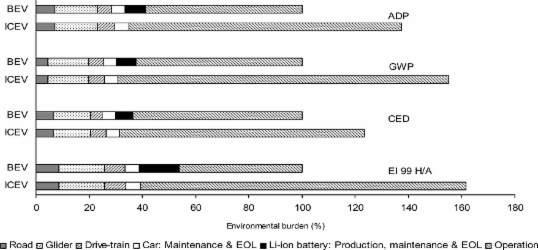Revised 11/21/2021
The Environmental Cost of Manufacturing and Driving Electric Vehicles
It's amazing how making incremental process improvements over the years really has made the environmental impact of manufacturing an EV (especially its battery pack) significantly smaller.
An electric vehicle that used to require 90,000 miles of driving to break even (to a comparable gas vehicle), now does it in under 13,500 miles. In regions with cleaner electricity (like Norway) the break even point is only 8,400 miles.
Check out this new study mentioned on this article on Reuters.
The online tool (mentioned in the article) for checking emissions in your state is located here.
Alternative Fuels Data Center: Emissions from Hybrid and Plug-In Electric Vehicles (energy.gov)

It compares the environmental break even point of manufacturing a standard range Tesla Model 3 against a fuel efficient gas powered Toyota Corolla.
Charging from the US electric grid, The Tesla Model 3 would only have to drive 13,500 miles before it overtakes the Toyota Corolla.
How polluting is charging an EV from the US electric grid Compared to driving a gas vehicle?
Back in 2009, a study by the union of concerned scientists looked at the US electric grid and how polluting it would be to charge up an electric vehicle in each region. It showed that an EV was less polluting than a comparable internal combustion engine vehicle in nearly all regions of the US power grid. They repeated the study again in 2014 and again in 2016. As old, polluting power generating equipment was retired and replaced with cleaner sources of electricity, instantly all the electric vehicles on the road also got progressively cleaner. Click here to read more about this progression.

In 2018 the Union of Concerned Scientists looked at EV emissions again. Guess what happened? By 2018 EVs charged on the US electric grid are even cleaner still.
Click here for details.

In 2018, in Colorado, an EV has an MPG Equivalent of 68 mpg. In the Northwest, an EV has an MPGe of 134 mpg. An EV charging in New York pollutes as much as a gas vehicle that gets 306 mpg. Wow!!
Not only is charging an electric vehicle cleaner than ever, all the factories that use electric power (that make EV components), like steel mills, battery manufacturing plants, glass, plastics and textiles are all cleaner as well.
Our homes and businesses that use electricity are all polluting less now as well.
I look forward to the next installment of EV Emissions from the union of concerned scientists. Maybe one using data from 2020?
Back to Electric Vehicle Home Page
Or continue scrolling for the original and antiquated JSE Article: The Environmental Cost of EVs.
Originally Published Thursday, March 8, 2012:
Rumor: Electric vehicles are more damaging to the environment than gas vehicles.
That may be true from a simple manufacturing perspective, mainly because batteries are environmentally costly to manufacture. But on a total life cycle comparison, EV's are the superior choice.

Assumed lifetime of 150,000km (~93,000 miles).
Shares correlating withthe components of an internal combustion engine car (ICEV, value in % of the BEV) and an electric battery powered car (BEV, the BEV is set as 100%) assessed with four impact assessment methods:
ADP Abiotic Depletion Potential-- ability to use up natural resources
GWP Global Warming Potential -- Global warming contribution.
CED Cumulative energy demand -- Total energy demand over whole life cycle
EI99 H/A -- Eco-indicator 99 – An environmental damage indicator
Road includes construction, maintenance, and end of life treatment (EOL). Even with using coal as a power source, the break even point for pollution of EV and ICE is 60.3mpg for ICE (Cumulative Energy Demand). Or 90.4mpg (EI99)
Propelling a BEV with electricity from an average hard coal power plant increases the environmental burden by 13.4%. On the other hand, using electricity from an average hydro-power plant decreases environmental burden by 40.2%
Environmental Science & technology Aug 9, 2010: http://pubs.acs.org/doi/full/10.1021/es903729a
As the electric grid transitions over to cleaner and cleaner sources of energy, EV transportation also becomes cleaner. --Revenge of the Electric Car.
